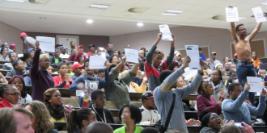
Chloé Osmond
On Monday 8 August, students of the University Currently Known as Rhodes (UCKAR) interrupted a seminar held by Higher Education AIDS (Heaids) in the Barratt 1 lecture venue.
The seminar was chaired by Criselda Dudumashe and Dr Mandy Hlengwa. On the panel was Vice Chancellor Mabizela, The Deputy Minister of Higher Education and Training, Mduduzi Manana, and The Director of Heaids, Ramneek Ahluwalia.
It was clear from the start that the meeting would be turbulent when some present in the room refused to sing the national anthem. Shortly afterwards Dudumashe introduced Vice Chancellor Mabizela to speak and he was met with some boos from the crowd. Protestors and concerned staff became increasingly dissatisfied with Mabizela’s response as his speech went on, with some shouting reminders about the interdict that remains in place and the failed talks they have tried to hold with him in the past.
“Everyone has the right to his or her bodily integrity,” stated Mabizela. At that, protestors stood at once, held up signs and shouted their frustration at what they called “his contradictions”. Some also removed their clothing.
The students and concerned staff expressed clearly that they are still angry and that the events of the #RUReferenceList protests have not been forgotten or found their conclusion.
Despite pleas from both chairpersons, Ahluwalia, as well as concerned staff member Lindsay Kelland, the room could not be placated. After a time, Mabizela walked out. It was later announced that there would be a break so that a private meeting could be held to discuss matters. The students rejected this solution. “You need to stop having private meetings without us,” complained a student. Thereafter, the seminar was called to a close.
After a recess, the protesting students returned to the venue to be informed about the way forward. Dudumashe arrived to deliver the message that the results of the discussions between the Deputy Head and university management will be delivered in the coming days. She also stated that there would be no further time for questions or discussion, as the time allocated for the seminar had come to an end. Some students complained about this, as the seminar had started 45 minutes late. Nevertheless, Dudumashe said her hands were tied.
Further chaos ensued after the meeting adjourned, with two students collapsing and receiving medical attention. It was also reported that protestors confronted Ahluwalia’s car as he left the venue.
Meanwhile, some of the seminar’s attendees were caught completely by surprise by the protest. Some expressed confusion and others, disappointment at having made the effort to come, only to have the seminar brought to a grinding halt by the protestors.
What follows is a full description of some the issues raised by the group during the meeting:
- The seminar was to be about sexual violence and gender-based violence, and yet, no women or queer individuals were set to speak. The only women present were the chairpersons. Instead, we were to hear from cis-het men about a plight that faces women and queer people especially and in ways they have not had experience with or understanding of.
- The event officials employed tone policing tactics throughout the protest. It was constantly reiterated, with a degree of condescension, that no discourse could take place with such a loud, angry crowd. Where the protestors became increasingly disgruntled and upset, Mabizela sat very calmly at the front of the venue and did not engage.
- In response to accusations that the protestors were disinterested in engaging in dialogue, it was reported that over the last months, meetings have been arranged between protest leadership and Dr Mabizela on several occasions. The demands of the students were not satisfied through these procedures and, on at least one occasion, Mabizela walked out on a meeting. “We want Mabizela to recognize that this is a lie. If he was really in solidarity with us, he wouldn’t have walked out on us while we were crying,” said a member of protest leadership.
- The protestors first main demand is for the suspension or expulsion of those listed on the Reference List. “I cannot keep walking on this campus with my rapist in the same class as me!” shouts one student. This demand is in place because it is impossible for dialogue to take place when students do not feel safe, or feel as though the management is protecting the interests of the accused perpetrators.
- Secondly it has been asserted that the interdict should be removed. This demand is in place because the interdict restricts many of the ways students have previously used to protest. As such, there are no mechanisms in place to truly hold the university management accountable for promises they make about solutions to be put in place to deal with rape culture in the institution.
- A further criticism of the event was that it was not widely publicised. Students claimed to have heard about it via the grapevine or on social media. Some media outlets claimed to have received email invitations to the event, while others heard nothing about it. This lead to accusations that Mabizela was being disingenuous – “saying all the right things for the cameras,” as one student put it – but did not want students to know, so as to avoid disruptions like that which occurred. In addition, management was criticised for having spoken to an outside party such as Heaids about issues of sexual violence, before and instead of talking to protest leadership.
For more on this story, see Activate’s Twitter and YouTube.
Photo taken by Chloé Osmond.
